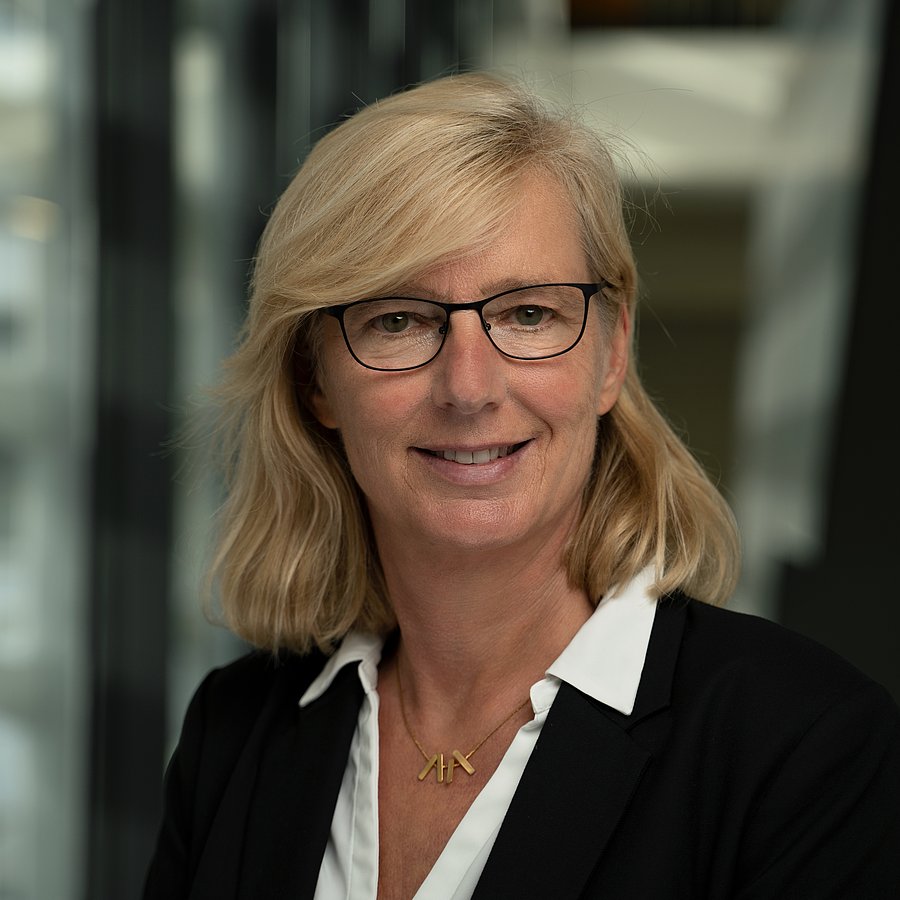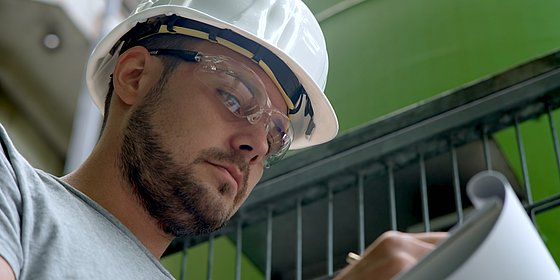
Opportunities for engineers
Prof. Dr.-Ing. Katharina Löwe / Process and Plant Engineering
Photo: Paul Nick
Future topics offer opportunities for engineers
Prof. Dr.-Ing. Katharina Löwe from the Chair of Process and Plant Engineering on the exciting tasks of the engineer and the social and safety-related changes in technology
"If young people want to have something to do with future topics such as environmental technology or energy technology," says safety engineer Katharina Löwe, "and if they want to make a difference in the world, then becoming an engineer is the right thing to do." Germany will need as many engineers as possible in the coming years, knows the scientist, who heads the Chair of Process and Plant Safety at Bergische Universität. The big problem here, she says, is the fact that technology is not promoted enough in schools, which means that children and young people have too little access to engineering topics. University programs such as MINT weeks(mathematics, computerscience, natural scienceand technology) or the student photo days are offered regularly and meet with great interest among students, but more needs to be done in the future to introduce students to these topics.
Process technology and plant safety
Löwe has been head of the Process and Plant Safety Department at Bergische Universität since 2020. "Process technology deals with energy- and material-converting processes. For example, environmental engineering, chemical engineering, petrochemistry, food chemistry, but also energy engineering and plant engineering fall into the area. What we teach in process engineering, among other things, are basic processes by which substances can be produced and processed." That could be orange juice, which is used to make a concentrate, or it could be petroleum, which is broken down in industry into the various products of gasoline, heavy oil, fuel oil and so on. "There is a large amount of different processes, which in principle are the same in the different industrial sectors, the boundary conditions only differ. So the methodological training is relevant for the different industries," says Löwe. The advantage for students with this training, he says, is the wide range of career options and areas of responsibility in the various industries, with very good career opportunities.
Approaches to make industry sustainable
Process technology is characterized on the one hand by a high risk potential and on the other hand mostly by a high energy demand. The aim of our research is to develop approaches to solutions in order to design and operate plants and processes safely and sustainably at the same time. "What we're seeing right now, this extreme increase in energy prices, is forcing us to push necessary changes and renovations in the industry more quickly." Increased integration of renewables and conservation of resources are issues that could have been dealt with before, he said. "The conversion now is expensive because we waited too long," the expert emphasizes.
Circular economy using the example of the electric car battery
The recycling of valuable materials from waste also falls within the scope of process technology, with Löwe emphasizing the idea of a circular economy. "Strictly speaking, recycling is only the last step. We need to move toward a real circular economy with approaches such as re-use and re-purpose. Only when these methods have been exhausted should recycling be consistently applied. A current example, he said, is the debate over the sustainable use of electric car batteries. "These batteries decrease in capacity due to aging, and at some point their use in cars is no longer useful or acceptable. If the battery is disposed of directly after the end of its use in the car, the sustainability of the e-car is limited. Therefore, new approaches for a second life of the batteries have to be developed." One possibility, for example, would be stationary applications in industry. Where battery weight is not critical, multiple batteries can be coupled. "These batteries sometimes contain expensive raw materials, have been manufactured at great expense and can be used in other applications for a longer period of time." The goal in process engineering for new processes is to consider the entire cycle from the start and make existing processes more sustainable. The sustainability of a plant is determined by various parameters of the economic, ecological and social areas. "Where we need to go - and that's what we're trying to train here as well - is to take a holistic view of plants and optimize them."

Job description: Engineer
Photo: ZIM
Modern issues in technology
"We are currently experiencing strong social changes and technological developments. ", explains Löwe. Developing solutions to increase safety and sustainability is one of the important tasks in her field, she says. New safety challenges have to be taken into account and safety analyses have to be developed accordingly. "Every new development has an impact on security again," she explains. Current issues, for example, are cyberattacks in the form of hacker attacks on plants or the switch to climate-neutral energy sources, such as hydrogen, she says. Hydrogen has different physical and chemical properties than natural gas, such as an increased risk of explosion. When switching from natural gas to hydrogen, the safety requirements must therefore also be taken into account in a new way. For Löwe, the main focus is always on practical applicability, which can be achieved through close cooperation between research and industry. In order to be able to implement new findings, cooperation with authorities and politics is required. Löwe himself is a member of the Commission for Plant Safety, an independent body that advises the German government on plant safety issues, and says, "Among other things, we develop guidelines with the question: how can new findings and experience be implemented practically and incorporated into legislation?"
From the laboratory to use in industry
"Our main task, in addition to completely new developments, is to bring findings from the laboratory to industry on a larger scale," says Löwe, citing, with regard to the sustainability aspect, the example of drinking water production from seawater. Previous thermal processes were very energy-intensive because the seawater was evaporated. A new method now uses membrane technology. "With the focus on energy efficiency, these membranes no longer need thermal energy, but electricity to drive the pumps. If you use photovoltaic technology to generate the electricity from sunlight, this very energy-intensive process can be converted to a more sustainable process." The example of the development of these membranes shows very well the spectrum of tasks for process engineers, which ranges from calculation to optimization and design to application in operation. Current topics are always integrated into the research of the safety engineers. In addition to the tasks already mentioned, this also includes the digitalization of plants, because "as the interface between the machine and the human being, the topic of safety takes on a new significance."
Thousands of engineers needed in the coming years
The managing director of the German Engineering Federation, Richard Clemens, says: 'We will need thousands of engineers in the next few years. "Even more, probably," the scientist confirms this thesis and continues: "We have an incredible number of technical and social tasks. These range from climate change to energy security, and we clearly have too few engineers. It's also a matter of concern to me to keep inspiring young people." The shortage of skilled workers must be viewed holistically, he said. "From daycare to school to universities. We can only build on what the school has given, and that is becoming less and less." As a conclusion, Löwe therefore urgently appeals to politicians: "To solve the problems of the future, we need intelligent, young people who are also well educated."
Uwe Blass
Katharina Löwe studied energy and process engineering at the Technical University of Berlin and earned her doctorate there. From 2009 to 2020, she taught as a professor at TH Brandenburg for the department of energy and process engineering. Since 2020, Löwe has been a university professor at the University of Wuppertal and head of the Process and Plant Safety department.
